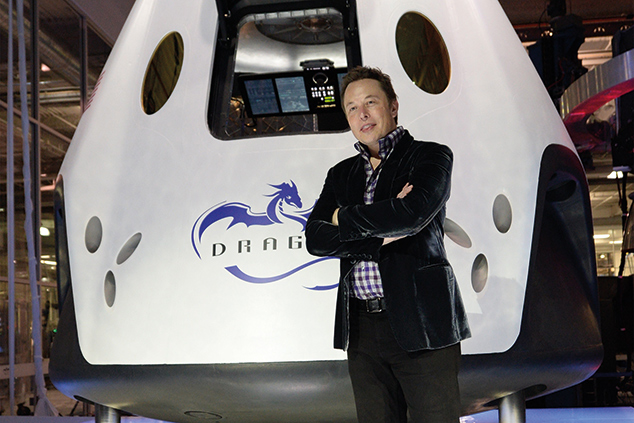
The man who promised he’d “help save Earth for humanity” and “colonise Mars” is now being forced to focus on some more “mundane goals”, says Russ Mitchell in the Los Angeles Times. In a note to employees last week Musk announced that although last year “was the most successful… in Tesla’s history”, he was going to fire 2,500 workers (around 7% of the company’s full-time workforce) in order to cut costs.
The hope is that this will help get Tesla closer to its goal of a $35,000 mass-market Model 3 electric car, which currently looks like a “mirage”. At present, “none of Tesla’s cars… is priced for a middle-income buyer”. Customers usually pay around $60,000 for a Model 3 after adding a few extras; they start at $44,000. The news went down badly on Wall Street, with the company’s share price falling 13%.
The move has prompted investors to question whether Tesla “can sustain demand for its priciest vehicles”, says Matthew Rocco in the Financial Times. Still, Tesla isn’t the only car company tightening its belt “as costs rise and competitive pressures increase”. For example, General Motors announced a few weeks ago it was cutting back in North America and Canada, while Ford has announced cuts in Europe. There’s also the hope the launch of Tesla’s Model 3 in Europe and China could offset any drop in demand in the US.
Lowering expectations
The problem is that while investors in car companies usually “judge their companies chiefly on how quickly management accepts the essential grimness of their reality”, Tesla isn’t meant to be an ordinary car company, says Bloomberg’s Liam Denning. So while it’s “laudable” it is trying to increase efficiency, the fact is that “spending and capital investment should be increasing” so that the company has a chance of producing the “staggering growth” required “to justify” its valuation. These redundancies, along with price cuts, are undermining “the story of limitless growth”.
Moreover, although it’s “hardly unprecedented” for an upstart company to expand too quickly, “growing pains aren’t baked into the company’s lofty valuation”, says Charley Grant in The Wall Street Journal. The cuts, as well as $10bn in debt, are going to make it even harder for Musk to fulfil grandiose promises of fully self-driving cars, new passenger and freight vehicles and roofs that can generate solar power for homes. It’s going to be interesting to see how long investors can “insulate themselves from reality”, given the stock trades at 50 times 2019 earnings. What’s more, “those earnings estimates are likely heading lower and that multiple higher”.
All this talk of cutbacks is “effectively a profit warning”, says Reuters’ Antony Currie. Still, it’s refreshing to hear a “rare dose of realism” from Musk, who has spent far too much time hyping up the car company’s performance. If his “unusual openness” is the start of “a more pragmatic approach” after “years of overpromising”, then that’s no bad thing.
Britain’s ten most-hated shares
These are the ten most unpopular firms in the UK, based on the percentage of stock being shorted (the “short interest”). Short-sellers aim to profit from falling prices, so it helps to see what they’re betting against. The list can also highlight stocks that may bounce on unexpected good news when short-sellers are forced out of their positions (a “short squeeze”). Engineering firm Babcock’s chairman Mike Turner is to leave amid rumours that the group is in poor health; BNP Paribas has downgraded troubled oil services firm John Wood Group.
City Talk
► Many people will be feeling a “certain schadenfreude” at Ryanair’s latest profit warning, says The Independent’s James Moore: the budget airline has “made scant effort to win friends among customers, staff, the media, even investors on occasion”. And CEO Michael O’Leary has warned forecasts may be reduced further owing to intense competition over the winter. However, Ryanair still has “both the resources and the wherewithal to outlast and outpunch its rivals when it comes to the current price war”. This means that when the fracas finally ends, Ryanair will be “in a good position to make back the money it has lost, and more”.
► Before his arrest, Nissan’s Carlos Ghosn (pictured) was the “quintessential Davos figure”, says Bloomberg. However, instead of “hobnobbing with the global elite” at Davos, he’s now “languishing in a Tokyo prison”. And this is unlikely to change any time soon since a court has rejected his “last-ditch” bail effort. This was despite his offer last Monday to remain in Japan, “pay for an electronic tracker” and be monitored by private security guards while he awaits trial for understating his income at Nissan by “tens of millions” of dollars and misusing company funds.
► Last week Netflix announced it was increasing prices for its US consumers, a move cheered by analysts, says the Financial Times’s Anna Nicolaou. Although a “mixed performance on revenues, earnings and subscriptions” a few days later ended the rally, investors still have reason for cheer. The 29 million rise in the number of subscribers underscores Netflix’s ability to attract new customers as it pours billions into new films and television shows, “regularly outbidding traditional Hollywood studios and TV networks”.